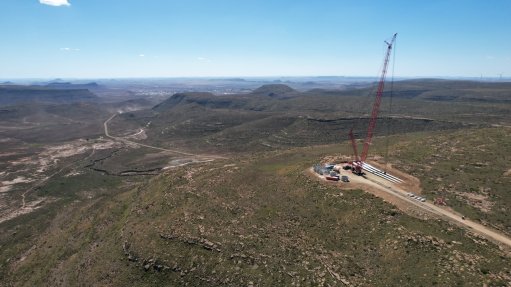Council for the Built Environment announces initiatives to drive transformation
Transformation in the built environment has progressed at a slower rate than in other sectors, such as the financial sector, with only 26% of all registered built environment professionals being previously disadvantaged individuals and only 0.3% of all registered professionals being women, Council for the Built Environment (CBE) CEO Priscilla Mdlalose said in an address at the CBE’s second yearly Transformation Indaba.
The CBE’s analysis of built environment professional candidacy, however, indicates that the majority of participants are from previously disadvantaged groups and that women candidates now make up 35% of all candidate built environment professionals, raising the hope that transformation will grow at a faster pace in future.
Mdlalose said transformation had been hampered by poor skills development programmes, inadequate funding, market factors, capacity constraints, fraud and corruption and data inconsistency and inaccuracy.
“To enhance transformation interventions, we need an industrywide strategy that uses a skills development process, such as the CBE Skills Pipeline, for sustainability in the industry to ensure that quality is not compromised with built environment advancements and projects to fix historical imbalances.”
Mdlalose said in-depth consultations with stakeholders were critical, as well as partnerships between the public and private sectors and society.
The CBE wants to establish an institution with oversight of transformation initiatives and to advance human resource development from primary school to professional status, using programmes and awareness creation around subjects required to ultimately enter the built environment professionally.
It also wants to drive a structured candidacy programme, establish sustainable funding for bursaries and design a sectorwide monitoring mechanism that the oversight institution will use.
“The success of the CBE’s efforts depends on buy-in from public- and private-sector stakeholders, the successful establishment of a fund to sustain transformation initiatives, positive participation from stakeholders in the education and training value chain, and the willingness of the private sector to fund key programmes and commit to workplace training of candidate professionals,” noted Mdlalose.
Turner & Townsend associate director, CBE council member and Transformation Indaba programme director Noluthando Molao said political emancipation had to translate into economic emancipation, through transformation initiatives, to build a better South Africa for all.
Within the South African context, Molao explained, transformation specifically related to addressing past injustices created by the apartheid system, which still affected the built industry today.
Transformation, both in the South African built environment and in society at large, is much broader than the promotion of the previously disenfranchised into positions of social and economic empowerment.
Within the built environment, the CBE believes that, besides the quantitative aspects, relating to representativeness, transformation should also be closely linked to qualitative changes that will lead to the empowerment of built environment professionals, while unblocking the skills pipeline and generating new knowledge that enhances the contribution of the built environment professions to the developmental objectives of the country.
“Essentially, transformation should entail the creation of an enabling and sustainable environment, which will allow each and every South African, regardless of race, gender, age or disability the opportunity to actualise their dreams,” said Molao.
This year’s Transformation Indaba was themed ‘Igniting the Possibilities’ and the event dealt with unlocking the built environment skills pipeline through adequate resource mobilisation, skills development and leading the South African built environment sector into the Fourth Industrial Revolution.
“The skills pipeline essentially depicts and explains the journey an individual needs to undertake . . . in order to become a registered professional. This journey starts at the foundation stage of early childhood development and schooling and progresses all the way through to eventual retirement as a professional.
“Throughout this journey, individuals are faced with a variety of different challenges that will hinder their progression and might deter them from reaching their envisaged destination. These challenges mainly relate to the limited availability of resources, both financial and human,” said Molao.
Comments
Press Office
Announcements
What's On
Subscribe to improve your user experience...
Option 1 (equivalent of R125 a month):
Receive a weekly copy of Creamer Media's Engineering News & Mining Weekly magazine
(print copy for those in South Africa and e-magazine for those outside of South Africa)
Receive daily email newsletters
Access to full search results
Access archive of magazine back copies
Access to Projects in Progress
Access to ONE Research Report of your choice in PDF format
Option 2 (equivalent of R375 a month):
All benefits from Option 1
PLUS
Access to Creamer Media's Research Channel Africa for ALL Research Reports, in PDF format, on various industrial and mining sectors
including Electricity; Water; Energy Transition; Hydrogen; Roads, Rail and Ports; Coal; Gold; Platinum; Battery Metals; etc.
Already a subscriber?
Forgotten your password?
Receive weekly copy of Creamer Media's Engineering News & Mining Weekly magazine (print copy for those in South Africa and e-magazine for those outside of South Africa)
➕
Recieve daily email newsletters
➕
Access to full search results
➕
Access archive of magazine back copies
➕
Access to Projects in Progress
➕
Access to ONE Research Report of your choice in PDF format
RESEARCH CHANNEL AFRICA
R4500 (equivalent of R375 a month)
SUBSCRIBEAll benefits from Option 1
➕
Access to Creamer Media's Research Channel Africa for ALL Research Reports on various industrial and mining sectors, in PDF format, including on:
Electricity
➕
Water
➕
Energy Transition
➕
Hydrogen
➕
Roads, Rail and Ports
➕
Coal
➕
Gold
➕
Platinum
➕
Battery Metals
➕
etc.
Receive all benefits from Option 1 or Option 2 delivered to numerous people at your company
➕
Multiple User names and Passwords for simultaneous log-ins
➕
Intranet integration access to all in your organisation

















